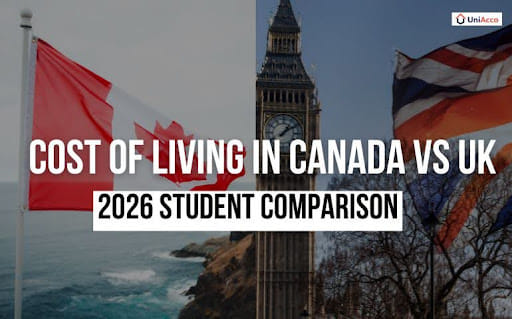Applying to UK universities through UCAS can feel overwhelming, especially if you are going through it for the first time. From choosing the right courses and meeting deadlines to writing a personal statement and understanding Clearing, there’s a lot to keep track of. That’s why we have compiled this comprehensive UCAS FAQ guide to answer the most common questions students have, whether you are a UK resident or an international applicant.
This guide covers everything from how UCAS works to tips for interviews, making your application journey smoother and more informed.
UCAS FAQs: General Questions
- What is UCAS?
UCAS (Universities and Colleges Admissions Service) is the UK’s centralised service for applying to undergraduate courses at universities and colleges. All applications to UK higher education institutions are made through this system
- Is UCAS only for undergraduate courses?
UCAS is mainly used for applying to undergraduate courses in the UK and also supports degree apprenticeships and some teacher training programmes. Most postgraduate applications are made directly to universities, with limited use of UCAS Postgraduate.
- How can I narrow down my options when there are so many institutions and schools to choose from?
Use UCAS search tools and university comparison websites to filter by subject, location, entry requirements, and other preferences. Tools like Uniselect can help you shortlist universities that best match your grades and goals, making the decision process more manageable
UCAS FAQs on Application Process
- How do I apply for UCAS?
You apply online by registering with the UCAS Hub, filling out your personal details, education history, course choices (up to five), and a personal statement, then submitting your application before the relevant deadline
- What are the UCAS application deadlines?
UCAS application deadlines vary by course. For 2025-26, the early deadline is 15th October 2024, with the final deadline on 30th June 2025. For 2026-27, key deadlines include 15th October 2025 for Oxford and Cambridge, and 14th January 2026 for equal consideration.
- What if I submit my application through a school, institution, or organisation?
If you submit your UCAS application through a school, institution, or organisation, they will assist you in completing the application process and submit it on your behalf. They will also provide guidance and support with writing your personal statement and arranging your reference. However, you still need to ensure that all sections are completed, including payment for the application fee.
- What happens if I apply as an individual?
If you apply as an individual (independent applicant) through UCAS, you create your own UCAS Hub account, complete the application yourself, and do not need a school, college, or organisation to submit it for you. You will fill in your personal details, qualifications, course choices, and personal statement directly online, then pay the application fee before submitting. You will also need to provide a referee’s reference, which you can enter yourself if you are not connected to a centre.
Also Read: All You Need To Know About UCAS Application 2025-26
UCAS FAQs: Eligibility and Reapplication Questions
- Am I allowed to submit a second UCAS application?
No, you are allowed to submit only one application at a time. However, if you don’t receive any offers or if you decline them, you can reapply through UCAS Apply Extra or Clearing.
- Can I apply to both Oxford and Cambridge through a single UCAS application?
No, you cannot apply to both Oxford and Cambridge in the same application cycle. UCAS regulations permit applicants to submit only one application to either Oxford or Cambridge for undergraduate courses in a given year. This policy ensures that applicants focus their efforts on one institution and allows both universities to manage their admissions processes effectively.
- Can I reapply to universities if I have a deferred offer?
If you hold a deferred offer, you generally cannot reapply for the same cycle without withdrawing your deferred place first. You must cancel your deferred place before submitting a new application.
- Can I apply for UCAS if I’m currently enrolled in another university?
Yes, you can apply through UCAS even if you are already attending a university. You need to submit a new application independently and may have to explain your reasons for transferring. Some universities might have specific policies regarding current students applying.
- What is UCAS Clearing and how does it work?
UCAS Clearing is your second chance to get a university spot if you don’t have one yet, whether you didn’t receive offers, missed your grades, or changed your mind. It connects you with universities that still have course vacancies. Clearing opens in early July and runs until mid-October, with peak activity around A-Level Results Day. It’s a flexible, fast-moving process where you can explore available courses and contact universities directly to secure a place.
Also Read: UCAS Clearing Process Explained: Your Guide to Last-Minute Admissions
UCAS FAQs: Application Form and Reference Essentials
- Am I allowed to apply to the same course at multiple universities or institutions?
You are allowed to apply to the same course at multiple universities or institutions through UCAS. This is a common strategy to maximise your chances of receiving offers, especially for competitive courses. Each university will consider your application independently, and they will not know which other institutions you have applied to for the same or different courses
- How many universities or colleges can I include in my application?
You can apply to a maximum of five courses through UCAS in a single application cycle. These five choices can include the same course at five different universities, different courses at the same university, or a combination of various courses at different universities.
- Who should I ask to write my reference?
You should ask someone who knows you in an academic setting to write your UCAS reference. This is typically a subject teacher, tutor, Head of Sixth Form, school counsellor, or Head of Department. If you are applying independently, the reference should come from someone who knows you academically or professionally, but not a family member or relative.
UCAS FAQs: Qualifications and Exam Results
- How should I enter my academic qualifications as an international student?
As an international student, you should enter all your completed and ongoing qualifications accurately in your UCAS application, including the name, awarding body, subjects, and grades or predicted grades. Since most international qualifications aren’t included in the UCAS Tariff, universities will assess them individually. If needed, you can get a Statement of Comparability from UK ENIC to help verify your credentials.
- What does it mean when exam results are certified?
Certified exam results are official documents that have been verified as authentic by a recognised authority, such as your school, a notary, or a government official. Universities request these to ensure your qualifications are genuine before making a final offer or enrolling you.
- What are the basic eligibility requirements to be considered qualified?
To be considered qualified, you must meet the course’s academic requirements, including specific grades and subjects. You may also need to show English proficiency, pass admissions tests or interviews, and meet any additional checks. Universities also assess your personal statement and relevant experience.
- Am I required to submit IELTS scores with my UCAS application?
You don’t need to submit IELTS scores with your initial UCAS application. However, most universities will ask for proof of English proficiency later, especially for non-native speakers or those applying for a UK student visa.
UCAS FAQs: Personal Statements and Gap Year
- Am I allowed to include non-English characters or symbols in my UCAS application?
Yes, you can include some European (non-English) characters in your UCAS application, but not all characters are supported. Some may be automatically replaced with UK equivalents, so it’s essential to check the UCAS Extended Character Sets Substitution List to see how they will appear after submission.
- What is the word or character limit for the personal statement in my UCAS application?
The UCAS personal statement has a limit of 4,000 characters (including spaces) or 47 lines, whichever comes first. Blank lines count toward both limits, so it’s best to stay slightly below the maximum to ensure your entire statement is submitted properly.
- Should I include details about my gap year in my UCAS application?
It’s not mandatory to include details about your gap year, but it’s highly recommended if your experiences are relevant to your course or show personal growth. If you travelled, worked, volunteered, or developed new skills, explaining how these prepared you for university can strengthen your application.
- Where can I get help or guidance if I have questions about my personal statement?
If you have questions about your personal statement, you can seek help from school or college advisors, such as teachers or career counsellors. You can also use the UCAS website’s official guides and personal statement builder, explore university websites for tips, or refer to trusted platforms like The Student Room and Studential. Friends and family can review your drafts, but the content should be your own.
UCAS FAQs: After Submission and What to Expect Next
- What should I expect after submitting my UCAS application?
After submitting your UCAS application, universities will review it and start responding typically between January and March, with either conditional or unconditional offers. You will need to reply to these offers by the given deadline through the UCAS Hub, and if needed, you can explore Clearing for other options.
- Can the universities or colleges I have applied to see my other choices?
No, universities and colleges cannot see the other courses or institutions you have applied to. UCAS keeps your choices confidential, and each university receives and reviews your application independently.
- What should I do to get ready for a university interview?
To prepare for a university interview, research the course and university thoroughly, review your personal statement, and practise answering common interview questions. Stay calm, be yourself, consider doing a mock interview, and prepare thoughtful questions to ask the interviewer to show your interest and engagement.
UCAS FAQs: Extra Insights Students Often Ask
- How does the UCAS Tariff system work and what does it mean?
The UCAS Tariff is a points-based system that assigns numerical values to post-16 qualifications like A-Levels, BTECs, and Scottish Highers, helping universities compare applicants fairly. Each grade is worth a specific number of points; for example, an A* at A-Level equals 56 points. Not all universities use Tariff points, but when they do, you can calculate your total using the UCAS Tariff Calculator.
Also Read: UCAS Tariff Points Explained: A Simple Guide for Students
- How can UCAS Extra support me in applying for a course if I haven’t received any offers?
UCAS Extra allows you to apply for additional courses one at a time if you have used all five choices and haven’t received or have declined all offers. Running from late February to early July, it gives you another chance to find a course with available places without submitting a new application.
Also Read: What is UCAS Extra? A Complete Guide For 2025-26 Students
- What can I do to make my UCAS application more noticeable or impressive?
To make your UCAS application stand out, write a strong personal statement that highlights your motivation, relevant skills, and experience. Include any work experience, extracurriculars, or achievements that support your interest in the course, and ensure your academic qualifications meet the entry criteria. A solid reference and a well-researched, error-free application also help make a strong impression.
- What is the difference between UCAS Extra and Clearing?
UCAS Extra lets you apply to additional courses one at a time if you have used all five choices and have no offers, and it runs from late February to early July. Clearing, on the other hand, starts in July and helps you find available courses if you didn’t get any offers, missed your conditions, or applied late.
The entire UCAS process doesn’t have to be complicated. With the right information at your fingertips, you can make confident decisions about your course choices, application timeline, and how to present yourself effectively. Whether you are just starting your application or preparing for interviews, this UCAS FAQ guide is designed to help you every step of the way. Still have questions? Reach out to your school advisor or check the UCAS website for official updates and tools.
And once your university place is sorted, don’t forget to book your student accommodation early. UniAcco helps you compare and secure verified student housing near top UK universities quickly, easily, and with expert support.















0 Comments